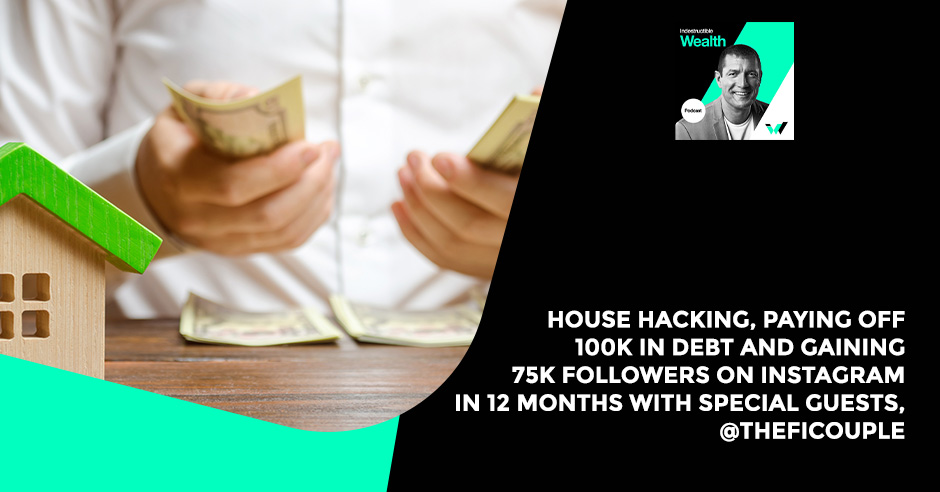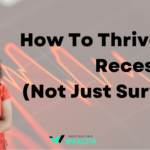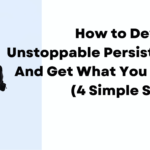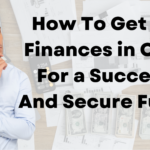
Josh and Ali (aka @theficouple) are a young couple who have made huge leaps in wealth building in a short time.
How did they do it? Tune in!
Please subscribe, so you will never miss another episode. Then visit me at www.myindestructiblewealth.com
—
Listen to the podcast here
House Hacking, Paying Off 100k In Debt And Gaining 75k Followers On Instagram In 12 Months With Special Guests, @theficouple
I’ve got special guests on. I’m excited about this interview. I know you guys are probably like, “Finally, some guest speakers. I’m tired of listening to you go on us.” You guys are in luck this time. I’ve got young on-the-rise superstars on Instagram. I want to tell you guys a little bit about them. They’ve paid off almost $100,000 in debt in less than 3 years. In fact, they made a pretty big payment, so they’re super close, which is awesome. I’m excited for you guys. They own 2 duplexes, so they have 4 units that are producing cashflow on a monthly basis, which you guys all know I’m a huge fan of rental property. Sometimes, I’m not quite sure if I love it or hate it, but most of the time, it’s pretty awesome.
They also get this in 2020. This is November 2021 that we’re recording. They started their Instagram handle, which is @TheFICouple, assuming that’s short for the finance couple. They have 75,000 Instagram followers. No matter what line of business or whatever you do, they’re going to teach us how to scale an audience, which is going to be awesome. Also, in their part-time around two full-time jobs, they’ve had 800 download sales of their eBook on getting started in real estate investing.
—
Ali and Josh, welcome to the show. It’s a pleasure to have you.
Thank you for that amazing introduction, Jack. I’m very flattered. I’m like, “We have done some cool stuff.” We’re excited to connect with you.
When you get caught up in the hustle and bustle of everything, and you get so focused on where you are, it’s easy to lose track of some of the stuff that we’ve done so far. Thank you for that.
We all need to remind ourselves and stop and take a little bit of inventory of how much we’ve done. In this show, the way that I speak is going to attract achievers. It’s going to repel everybody else. I already know who’s tuning in and we have this tendency, as achievers, to constantly be looking to the next thing and never stopping.
I hate to say, “Smell the roses,” because whoever does that? Being present and mindful and saying, “You’ve done good, dude. Maybe calm down a little bit and enjoy what you’ve achieved.” That’s very hard for us to do because we keep wanting to drive for more. At any rate, it is important to do that. You guys have quite the resume and you’re getting started. Tell us a little bit about your background. I know you guys both have full-time jobs. You’re very young. You posted on your page, Ali, that job is gone, which is exciting. Tell us what’s going on. How did you guys get started in finance and where did it all begin?
It all began at a state college in New York. This guy was in my major. We were both majoring in Child and Family Studies when we met. Josh was 1 of 3 men in our major, so he stood out because it was predominantly women. It’s unlikely candidates for real estate investing and all of that. We were human service professionals making very low to average salaries. I remember in college, our professors told us, “You are probably not going to make a lot of money in life and have a great financial position. That’s the field you signed up for.”
Your career is that you’ll go into for impact and help people, but don’t bother trying to make a comfortable living. That was our baseline. We met in college. We didn’t start dating right away. We were friends for several years.
You were in the friend zone.
He was literally so friend zoned.
I was dating someone, and she was single.
I called him the boy with the girlfriend because he had a girlfriend.
It’s a long story but eventually, I didn’t have a girlfriend, but she had a boyfriend. Back in 2013, stars aligned and we were both single so we’re like, “Let’s take a chance on it.” That’s how we got started dating. For about five years between us both working full time, Ali went back for her Master’s. We’re living life and figured, “This is what people do. Things will work out.”
We weren’t thinking about our finances. We were broke most of our twenties, in debt, and living a very leveraged lifestyle of spending more than we were making. We weren’t doing all those things that society tells you to do. We felt it was important to do. We weren’t thinking much else.
It wasn’t until the middle of 2017. Ali was getting ready to graduate with her Master’s and for the heck of it, I was like, “We’ve never tallied up. I know we have student loans, but we’ve never looked at them. Maybe we should figure that number out.” It was right about that time doing the math, I was like, “We got over $100,000 in student loans. We went to a state college. How the hell did that happen?”
You weren’t aware that you had accumulated over $100,000 when you checked?
We knew intellectually somewhere in that range. It was like that head in the sand. We know we have this debt, but whatever. Everyone has debt.
One thing I’ll say too is both being human service professionals, we are eligible for the Public Student Loan Forgiveness Program. It sounds great on paper and it might work for some, but what it conditions you is to not think about your total gross amount of debt.
It conditions you to focus on that income-driven payment. Our payment at that time was $200. I was like, “That’s our debt.” I wasn’t thinking $100,000-something. They’re like, “That’s totally going to get forgiven. We have to work in these low-income jobs for 10 or 12 years or whatever it is.
I know this is a lengthy introduction, but we realize at the year of our wedding, Josh had gotten laid off from a long-term employer. We now were working on one income, which again, a less than $50,000 income. I think I started my career with the Master’s making $45,000 and $60,000-plus in debt. Very quickly, we said, “We need to shift some stuff around because this is not working and this is not the life we want to live.”
You guys said, “We’re going to attack this debt,” once you become aware of it. You’re like, “This is a pretty big number. We want to get this energy released out of our lives.” Ali, you were still working a job in social work even though that doesn’t pay a lot. How did you guys do this in three years? It’s almost $100,000. There are people that make 2 or 3 times what you guys are making that would have trouble doing the same thing. What did that look like?
At about that time, we started calculating our debt. We also tried to say, “How can we get rid of it?” I went to the internet and the first thing that popped up was Dave Ramsey’s The Total Money Makeover. I ordered that book because, as I said, “This is a guy who talks about paying off debt and that’s what we want to do.” We started living the rice and beans lifestyle as they put it. We were cutting out the Starbucks, Netflix, and all that stuff but it didn’t feel like it was having as big of an impact. It felt like we were deprived. We’re saving $10 here, $15 there, and so on and so forth and we were both working a ton of hours. We knew we needed to make a change.
That didn’t feel super sustainable for us. For Josh, it brought him back to the internet to find something that did feel like a good fit for us. That is when we discovered the beautiful world of real estate investing.
Neither one of us don’t have backgrounds in real estate. Definitely, we don’t have backgrounds in finance. We discovered the term house hacking where basically you could buy either a single-family home and rent out all the rooms. In our case, you could buy a duplex, live in one unit, rent out the other unit, and you can use a load-down payment, which was good because we didn’t have a ton of money. Back of the envelope math, we were paying $1,300 a month in rent. I was like, “We could probably live for $300 a month instead of paying that much,” which would be a huge-savings for us.
Dave Ramsey’s super constrictive, restrictive process. I get that. A lot of people have had success with that but my philosophy aligns with what you guys are saying. You could only cut back so much to the point of if you’re unhappy and depressed, how long are you going to go before you think you go out and splurge?
I’m done with this thing then it becomes counterproductive so it does have to be something sustainable. I wasn’t even thinking about this before you came on, but you’re lining up the philosophy that I’ve always shared which is so much easier to produce more income than it is to cut back that much. I was on a coaching call with a gal who spends, between her and her husband, $2,300 a month on car payments for two cars.
They make $10,000 up to $20,000 on a good month and they have no money. That’s a situation where we need to cut back and sell the cars, liquidate the cars, or turn the cars back in and do that. You guys had already sounded like you had done a lot of the cutbacks and now is the time, “We got to make more money. We got to figure out how to get new, additional streams.” You bought the one duplex that you lived in on one side and rented out the other. How did you go about getting the other one?
We cut back as much as we reasonably could, but as renters, that is hard because you have money every month going to your landlord. For us, we said, “Let’s become the landlords.” Right away, we reduced our cost of living radically. We got rid of our car loans and we had used cars purchased in cash. We got rid of our car payments to zero. Our rent went from $1,300 a month to $600, so we cut that in half. With raising rent and doing some renovations, we eventually got down to $300.
Is that your total between the rent you’re getting on the other side of the duplex? Is it your total payment for the duplex minus out the rent and then your net payment was $300?
Yes.
We were paying $300 to ourselves.
We were able to radically reduce our cost of living. When you think of what people spend most of their money on, it’s housing, transportation, and food. Right there, we slashed housing and transportation. Having that extra breathing room allowed us to take more career risks. Josh went into more entrepreneurial endeavors that were able to have a higher ROI with his income. I was able to apply to another job that substantially raised my pay. Bit by bit, we were stacking the pieces in our favor to better our situation.
When you think of what people spend most of their money on, it's housing, transportation, and food. Share on XI was still driving for Uber. Ali started doing life coaching. I think at one point, we had seven jobs before social media or anything like that. Our goal was to grow the gap between our income and expenses. Between house hacking and having no cars, that lowered it probably about as far as it would reasonably go. If we want any lower, we would’ve gotten burned out. At that point was like, “How can we increase our income?” Between career changes, consulting, and all these different things, we started generating more revenue.
We were scrappy though. We had a vision. We knew what we wanted. We knew that we did not want to be in debt forever. We didn’t want to be broke forever. We wanted more time with each other. We made some uncomfortable decisions and some decisions that people all around us were like, “Are you guys crazy?” We did it and now, three years later, we’re starting to see some big payoffs from the choices that we made.
I’m seeing payoffs for things that I’ve done a few years ago. It typically takes 3 to 5 years before an investment of energy, to start a business or investment of money. They usually take 3 to 5 years to say, “Payday. This is worth it,” or more. In some investments, I’ve found take even longer than that. It’s important to think long term, long range. You guys are thanking your past selves. You’re saying, “Thank you so much for what you did for us because now we’re enjoying a better life.” With the other duplex, what is then the income from that?
That was a cool story. Again, our goal, in the beginning, wasn’t we want to be real estate investors. We don’t want to spend money on rent so we checked that box. We bought that at the end of 2018 and then in 2019, we started throwing everything we could at those student loans to start making progress. Along the way, we started networking. We were like, “This real estate stuff is powerful.” That was our first taste of getting money that wasn’t directly related to us working a job or whatnot. That first rent check was life-changing.
We spend a lot of time in our city networking and talking to other investors. We live in a nice little neighborhood and we so happened to walk past another duplex five houses down from our first duplex. We always thought like, “That would be so cool to own that property. Whoever owns it did a good job with it.” I’m a networker and it’s a small neighborhood. I started talking to people and they pointed me to the owner who actually happened to live in the neighborhood. We started having that conversation and he was like, “I’m willing to work with you guys. I don’t want to list it and I need to sell it quickly.”
Luckily, we’d been saving up enough where we could make it happen. In September 2021, we bought that duplex using a 3.5% FHA. We moved into the downstairs unit. We rented our old apartment, which now, that unit by itself covers the entire mortgage. That property cashflow enough so the portion of the rent, we would’ve had to pay down here, which was $200. That property pays that. Now, our housing is zero.
Incredible because most people are spending in their 20s $2,000 a month on rent or house payments. I talk to people all the time that have those numbers. For you to have that at zero and then have your cars at zero, you’ve got food and your incidentals, entertainment, and all that, you’re living to the point where you probably have a lot of investible dollars to work with. It doesn’t matter how much you make if you’re trying to build wealth anyways. What matters is how many investible dollars do you have per month.
When we first started our journey, we were at a negative percent savings rate. It was rough. After that first house hack, we bumped it up. In the second house hack, we were probably hovering at 60% savings rate. At this point, what would you say?
We save 100% of the income that we get from our jobs. By save, that’s how big student loan payments happen. Frankly, that’s how big renovation budgets happened. This property we bought was a lot more of a fixed upper than we budgeted for. Luckily, because there’s such a wide gap between our income and expenses, we’re able to cashflow the renovation. It’s not jobs as much frugal anymore, but all of that’s been going into paying off debt, saving up for our next rental property, and then everything else is going into the brokerages and traditional retirement accounts.
Did you use an FHA loan? Can you talk a little bit more to the readers about how you’re able to get it for 3.5% down?
For our first property, we used a 5% conventional loan and for the second one, we used a 3.5% percent FHA loan. The reason why we house hacking, which as Josh explained, you buy a property and you move into the property, is that you qualify for those very low down payment owner-occupant loans. We’re buying multifamily homes that will eventually be investments. When we move out of them, they are primary residents, but they are our primary residents so we can qualify for those low down payments.
If you were buying it as an investment rental property and not living in it, you don’t qualify for those types of loans. Therefore, you’re paying 20% but you typically 25% down.
That was the thing. That’s a huge hindrance to a lot of new investors because they don’t have that money. For our first house hack, we skipped our honeymoon. We scraped together every damn dollar that we had and we bought our duplex. That is not exciting or sexy for most people.
We took a three-day trip to the ocean, then we came back and we were like, “We have three months to buy a duplex.”
We use that money to get that investment. It opens investing to people that otherwise would be intimidated because you can move into your investment. If you need a place to live, buy a duplex and have someone pay for more than half of your mortgage. It gives you a nice experience with real estate investing to see if it’s something you want to pursue even more.

Wealth Building: You can move into your investment. If you need a place to live, buy a duplex and have someone pay for more than half of your mortgage. It really gives you a nice experience with real estate investing to see if it’s something you want to pursue even more.
You can only live in so many properties. Are you going to do another house hack the third time or are you going to do a traditional rental property? What’s the plan look like?
We change our mind every now and then because once you get a $0 housing payment, there’s something pretty nice about that that you want to keep that up. We had the goal that we wanted to have enough rentals where the cashflow will pay for a single-family home for us. No. We don’t plan to house hack forever. We are a little over happy to scrape every dollar that we put together. Very much for the next deal, we will be partnering with private money to purchase properties in cash outright, and we will eventually find ourselves in a modest starter home.
I would make the point that the biggest expense you’re ever going to have in your life is your taxes. You guys haven’t felt the effect of that yet, but you guys are on your way to being high earners so then you’re going to figure it out quick. Trust me. It is much bigger than housing, auto, and food combined by far. What’s great about what you’re doing with the house hack? Tell us about the tax advantage of when you go to sell. What does that look like? How does it work? You have to live in it for so long. Can you explain that? It’s incredible what you could say.
As “house hackers,” we get the same mortgage benefits as if someone were to go out and buy a traditional single-family home. To what you’re alluding to, we also get the same tax benefits for real estate. For instance, there’s what’s referred to, and this probably has a technical term for it, the 2 out of 5-year rule. For our very first duplex, we were there for almost two years. If we were to sell that, we wouldn’t pay any tax on any capital gains.

Wealth Building: As “house hackers,” we get the same mortgage benefits as if someone were to go out and buy a traditional single-family home.
The property is appreciated a lot because we did reside in that property where for a lot of investors, if they never reside in the property, they get a lot of capital gains and they don’t want to do a 1031 exchange. 1) They’re probably going to have to pay capital gains. 2) They may run into a depreciation recapture and all of a sudden, you could have this big chunk of equity and it can quickly get gobbled up by all those expenses because that’s some of the benefits that come with owner-occupying properties.
We always say, “Find yourself a good investor-friendly CPA.” We don’t have to be the tax experts because our CPA is. If there’s a write-off or expenses for the property, he’s going to help us find it. For us, it is buy-and-hold investors. We have no short-term plans to sell our properties. Our goal is to have a modest 8 to 10-unit portfolio that we maintain for a while as long as it makes sense for our life. That’s pretty cool.
I agree about working with your account for sure. What I’ve found is that talking to a lot of people at various stages of their investing careers is that the accountants don’t inform them proactively about things like the 2 out of 5-year rule. That was something that I didn’t even know up until not too long ago.
Surprisingly, I’m like, “Why didn’t I ever know that?” I wasn’t ever in a position where I had that advantage of a house actually that I lived in that went up in value to where I could take the capital gains. That’s huge. I had a property that I bought a few years ago in Arizona and I sold it for a $160,000 profit. If I would’ve lived in that, that’s 20% capital gains on $160,000.
That’s $32,000 that I would’ve saved on that sale if I had lived in it for a couple of years. That is a huge thing that you guys are learning. You want to start considering that. That’s why this house hacking system that they’re doing is so incredible, because not only are they living for free, but all the value increase as the government prints more and more money, which they’re not stopping on. Real estate is going to continue to rise in value. Now, you don’t have to pay taxes on that game.
We actually have friends. What you’re describing is literally their business model. They do live in flips in higher-cost-of-living areas. That’s places like Arizona and Denver, Colorado. It’s places where a lot of people think it’s impossible to buy, but they’re buying some pretty tough properties. They’re forcing the appreciation through sweat equity with the knowledge that if they’re there for two years or whatever, when they realize that, they’re going to have a huge chunk of equity, which they can then put into another piece of property. They then leverage up that way to the point where the equity becomes $200,000, $400,000 to $700,000 chunks of equity, especially in those higher price markets.
I love that strategy. Another thing that I talk about all the time is that I’m not a patient type of personality. I love action, deals, and models where I can force equity and take a business. With my energy, passion, and drive, I can force the value of that business up through the cashflow coming in. To be able to do the same thing in real estate, take a property and fix it up. You’re not waiting for the market to go up. You forced the value up with your actions like you did with your other duplex. On top of that, you don’t pay taxes on that forced equity plus the market appreciation equity gain. I love it. That’s incredible.
What’s cool too is Sometimes, the stock market is referred to as a perfect market. There are so many things and variables that go into it, whereas in real estate, you can use networking and stuff like that. In our second property, we bought it for $150,000 knowing that it was worth a lot more than that so it appraised for $168,000. Day one, that’s $18,000 in equity, but we knew through all the renovations that we did that we’d force the appreciation even more. If we sold it tomorrow, we’d probably sell it for about $190,000. That’s a $40,000 capital gain in 14 months.
That is on your net worth statement too. That’s what a lot of people don’t think about. Oftentimes, they don’t look at equity in real estate as that’s a serious increase in net worth in a very short period of time. How much time would it take you to create $40,000 when you’re working jobs then you’re getting taxed? Whatever’s left over after that, you have to invest that versus what you did, it made it happen a lot quicker. Talk about the segue of you paid off a lot of debt and you started getting some real estate and house hacking. How did that lead you to create your own financial platform, being influencers growing this large Instagram account, having a book that you’ve sold a ton of copies of? Tell us more. That’s awesome.
The Fi Couple was born in the middle of the night literally. We’re getting some traction, paying down some loans, and we got into our second duplex. I woke up in the middle of the night at 3:00 in the morning and I was like, “I think we should make an Instagram to document our journey.” I had all these ideas swirling around in my head and I woke Josh up at 3:00 in the morning and I’m like, “I have the best idea. We should do this.”
I remember he was like, “Yeah, okay. I’m going back to bed.” The next morning, he was like, “That’s the stupidest idea. We’re not going to do that.” He thought it was such a dumb idea. If you know us outside of The Fi Couple, we’re not social media people. We were never super engaged on social media or into it so it seems a little out of character maybe. The reason why I wanted to create this and do this is because we’ve listened to all the podcasts, read all the books, and all of this stuff.
Often, the stories that we heard about people that built wealth and found success were high-income earners. They either had money previously or were born in families where they learned about money in financial habits and they didn’t have any student loan debt. They had a lot of factors that were in their favor. I looked at us and we literally blundered through our 20s with $100,000 in student loan debt. We made 1,000,001 financial mistakes.
We had no financial backbone. We were very average income earners but we’re real estate investors. We are crushing our debt and we’re probably going to retire from our 9:00 to 5:00s in our 30s. I felt like we always heard that one story and I said, “I want to share a different narrative of folks that made tons of mistakes and they’re still figuring out the way to do it.” That was our thing. We’re pretty average people, but we have big dreams and share that message too.

Wealth Building: I want to share a different narrative of folks who made tons of mistakes and are still figuring out how to do it.
It the relatability factor of what you guys portray. You make a good point there. Each of us has our own unique voice and story and we’re going to relate to a subset of people and potentially not relate or repel other people. You guys, you have a very consistent message. You know your lane and who your audience is. I got to think that that’s a big factor in your success and all of that. Tell us a little bit more. You started in 2020. How did you build that account from waking up at 3:00 AM, have this inspiration, and getting shut down by negative Nellie over there? I don’t know what the negative version of the mail is. I don’t have that. To get this little Instagram account going, you have to start at zero, which is pretty tough as I’ve found out, now to 75,000. Tell us.
I’m a big Warren Buffett fan. A big thing he talks about is your circle of competence. You alluded to it before. We had that conversation that if we were going to create this, and it wasn’t perfect at first and it’s still a work in progress, what are we going to talk about? What’s our circle of competence? We had the dry-erase boards and everything like that.
We’re going to talk about real estate index funds and paying off debt. We went for the broadest, most average entry-level things because a lot of times, those necessarily aren’t the most cliquey things or what people are attracted to but those are the fundamentals. We played around with probably a dozen or so brand names and stuff like that. In The FI Couple, the FI is Financial Independence. We said, “We’re not financially independent yet. We’re about 50% of the way there,” which is a big reason why we want to start documenting it. Sometimes, you don’t hear from people until they’re at the mountaintop. They’re then trying to think reflectively, “This is how my journey was.” We’re not there yet, but we’re a few steps ahead of folks. That’s why we’ve been approachable and that’s driven the content that we produce.
We’ve wanted to stay within our circle of competence. We’ve also wanted to build that trust and authenticity. We are real people. This is who we are. This is what we believe in. Other than those two things with crafting it, you want to know the real thing of how we grew a brand painstaking hours, days, and time. To grow a social media brand is not passive. When we started, I was more like pie in the sky like, “This will be fun and a cute little hobby we do together.” The first week, we were like, “This is all-consuming. This is work.” It was not easy.
It was all-consuming then. Looking back, that was probably incredibly passive compared to where it is now.
That was a business.
What’s the work? A lot of people don’t have success on these platforms. I’m guilty of it in the past too. What does that work look like? I don’t know if people are that clear about how much effort and energy goes into getting the type of growth that you’ve seen, but where does the work go into? Are you following unfollowing people? Are you putting out ten posts per day on your newsfeed? Are you doing twenty Stories per day? Are you doing two Reels per day? You’re cranking out content crazy or is it more the engagement?
When you first start, you don’t know. We didn’t know. There are a few key levers that you can pull and I think that’s what drives growth. One, you want to have clarity on your message and you want to make sure every piece of content you’re sending is within your circle of competence and what your message is. You want to know who my ideal customer-follower person is that joins my page.
Have clarity on your message and make sure every piece of content you're sending is within your circle of competence. Share on XI want to speak to them every time I share information. A big thing for us is clarifying our message. Now that we have a clarified message, we have to share it with the world. We need to consistently deliver quality content that is sharing that message. With all of this social media, you have different algorithms. If you’re not engaging, you’re not going to show up on people’s pages. People won’t know you exist. I don’t think it needs to be 10 a day, but it needs to be at least 4 times a week posting. That can help drive traffic.
That’s pretty low compared to what other people have said to do or I’ve heard before. That’s a pretty reasonable amount of posting. That’s not even one day.
When we first started, we were posting 3 to 4 times a week. Now we’re probably doing five days a week. Again, that’s after a year of developing those systems. We probably post five days a week, but every day we’re sharing something in our Stories.
Sometimes, posting can be confusing because there is your main feed, which people see. That’s once a day unless we have a promotional opportunity in the evening that we might share. Within our Stories, we’re also sharing both our own content as well as other content I think. In the beginning, anything visual that you see, Ali has found a talent that she didn’t know. She had all the visuals. She’s very good at that. My stuff always looks like stick figures, but I’m the aggregator of knowledge. I’m a voracious reader of books and podcasts and everything like that. I then take that information to her and then she puts it into a way that she thinks will be received well by our followers.
In addition to sharing quality content, Instagram is a community and you want to engage with that community. Building partnerships and relationships with other pages and commenting on posts so that it drives traffic to your page. There are lots of those little nuances and strategies, but it’s a lot of levers.
In the beginning, that was probably our largest generator of traffic. I would go on very large pages of other brands who we resonate with. If you picture playing baseball. Looking at pitches coming at you, I would see a post, and quickly, I would say, “I resonate with that. I don’t resonate with that.” If I do resonate with it, I would try to leave a value-add comment, not just fire and thumbs up or something like that.
I’d actually tried to leave something insightful. A lot of times, what happens is, and this is all the little technical things, those comments get pinned. Now, if you have a very large page that’s getting hundreds of thousands of views, when they see that post, even if they scrolled on a little bit, they see the FI Couple. Whoever that creator was, saw value in my comment and we would see a lot of traffic, “That’s a great comment. Let me go find out more about them.” That then helped a lot.
How long are you on your Story for?
Not crazy. In the Story, it doesn’t have to be you. Maybe if there’s a page that you follow and you like their message, you can reshare their message on your Story and be like, “I love this post from the FI Couple.” Also, you could hop on yourself and do some engaging things. It’s good for people to see your face. They may ask us anything or you have your audience ask you questions. You want to be top of mind for people. You want people to hop on Instagram and be like, “I wonder what the FI Couple is doing.” When you’re consistently putting yourself out there, it creates a relationship with your community.
Consistently putting yourself out there creates a relationship with your community. Share on XOne thing I would say too and what I like about Instagram in comparison to other platforms is on the back end, they give you a robust amount of analytics. That’s been helpful for us. At least once a week, sometimes twice a week, we’ll go through all of our posts and look at all the analytics. Very quickly, you can see what people are engaging with versus what they’re not engaging with. That shows us, “This is what people like.” Therefore, this is what we’re going to offer them more of.
What are you looking for on the analytics in terms of you got likes, comments, shares, and saves. Those are the four main analytics. Below that, it’s going to show you how many accounts and new accounts you’ve reached. What are you guys looking for when you look at the analytics? Are you saying, “This post totally bombed out. This one I tried to figure out why. This one resonated and hit?” How do you determine whether something is successful or not?
That’s exactly it. In the beginning, we were throwing anything against the wall to see what stick. We tried all different types of content. Some of it did not do well. Some of it did. The longer you do it, you get to the science of it. We know what works and what our audience resonates with so that is what we share.
We used to think likes was the best barometer for people getting value from your content. Typically, what we look for the most are shares and saves. To us, those are good metrics of people saw real value in this, so much so, they decided that they’re going to share it with a friend or whomever or they thought it was so good that, “I have to come back to that and see it again.” Those are good.
Also, with Instagram, you can see how many of your own followers saw your content versus how many people who weren’t previously following you. It means the algorithm has determined that this is so good, it needs to let all these other people know about that. That’s always a good sign too because then you’re generating new content and new followers.
You guys have created some products or offered some services that you can help monetize your brand. Tell us a little bit about the eBook. What does it teach? How can the audience get ahold of it? What else do you offer in your scope of services?
Josh and I created a 53-page eBook all about house hacking. What we have done twice with our duplex is we made a lot of mistakes along the way, but we’ve learned a lot along the way. We wanted to share like, “This is our experience. This is what’s worked for us. This is what we’d recommend.” We share that with our audience because we get questions all the time about it. It’s the guide we wish we had when we got started with house hacking. We pack that in with as much information as we can. It’s been incredible because we’re sharing knowledge with our audience and we’ve also created another income stream for ourselves that can help us reach our financial goals.
That’s been transformative for us. Along with the eBook that we provide, we get so many questions on a day-to-day basis. A lot of them are elementary like, “What’s an index fund? What’s a Roth versus a 401(k)?” It got to the point where my hands literally hurt because you’re banging against a phone all day and you’re trying to answer all these questions. We said, “Is there a more concise way that we could go about providing webinars and other educational information beyond more content?”
We actually partnered with a business partner of ours down in West Virginia, where we have an online community educational in nature. We talk about everything, real estate, personal finance, debt payoff, side hustles, entrepreneurship, social media, you name it. It’s called More Than Money and we’re super proud of that.
We started that not too long ago and now we’re starting to get those testimonials of people who are a part of the community. They said, “Because of this webinar or because you guys shared that thing, we’re now starting to see success.” That’s a big motivator for us, but that’s also been a nice financial economic engine for us as well.
I have to say the reason why I originally reached out to you is because I’m the new finance creator. I’ve certainly done pretty well in the offline world, but I’ve never built a large social media presence. If I haven’t done it, I don’t know how to do it. I know I can know theory and I know all that, but when I saw what you guys were doing, I loved your content and message. You guys responded too, which out of five people, nobody else did, which is surprising. I offered to pay. Sometimes, you get messages where people want your time for free of course. Do you get those daily?
You got to set good boundaries there.
We’re getting better with that.
In our profession, especially as social workers, there’s so much of it. I was programmed in college like, “You’re not going to make money. You’re probably going to be a broke social worker.” Give your entire self and that is okay. I feel like that was the message I got. Somewhere along the line, I’m like, “That doesn’t feel good. I know that I have a lot to give and I know what I’m worth and this isn’t what I’m getting.” We’re still in the human services field, but we’ve found creative ways to increase our income and feel like we’re being compensated for what we’re worth. That is the beginning. That’s cool.

Wealth Building: We’re still in the human services field, but we’ve found creative ways to increase our income and feel like we’re being compensated for what we’re worth.
That was the one thing I told you guys when I saw your pricing. I’m like, “You guys got to charge more.” I understand. You were saying, “We work with so many beginners and they tell us we charge too much.” As you keep growing, you’re going to increase the demand and you’re going to get a higher-earning clientele that is going to want to tap your knowledge and expertise. Keep raising those prices steadily.
Something we talk about a lot is your money thermometer. A big thing for us is we were in that field and it was the norm to be broken, in debt, and not make a lot of money. That was our schema of money. That is what our view of expensive was, but what do they say? You’re the average of the five people you spend time with.
More and more, we’re trying to elevate our circle and surround ourselves with like-minded successful people that have been there and done that. They’re looking down from the mountain top and we’re like, “Those are the people that we want to get inspiration from and build relationships with because that is where we want to be one day.” Little by little, we’re raising that money thermometer and we’re doing it one step at a time.
For us, sometimes, admittedly Jack, it’s still a little bit scary because of our backgrounds. We’re like, “There’s real value that we’re providing.” If a person feels it’s too much, that’s totally fine. I’m sure someone else can provide them with their needs. We have enough people now who are echoing a similar sentiment of, “There’s real value here and you guys should probably charge more.” That’s also been a humbling experience.
I totally agree with the money thermometer. I’ve read Secrets of the Millionaire Mind. He calls it the money mindset. It’s called by different things, but wherever you’ve set the so-called financial temperature in your mind, you’re going to figure out a way to either create more money and raise your income and such to get to that point. If you exceed it, you’re going to figure out a way to sabotage yourself and how to get rid of it so that you lower yourself back to where your money thermometer is.
That’s why I’m constantly trying to figure out, tell myself, and program myself all the time that I am earning more money than what I’m currently earning. I tell myself always, it’s substantially more than what I’m actually making. I keep planting that seed into my subconscious mind and raising the money mindset. Last question. You guys like index funds. You promote it quite a bit. Why do you like them so much?
A lot of times, I speak in analogies. An index fund is like a basket. You could go out to the stock market and say, “I’m going to try to buy all of the best companies. I think I can pick the best ones.” It seems easy but statistically, especially over a long time horizon, it’s hard. With an index fund, instead of trying to find the needle in the haystack companies within the stock market, you can own the entire stock market.
There are also some index funds that are more so sector-specific like industrial, cannabis, technology, or all these different types of things. One of the things that you mentioned earlier is this love-hate relationship sometimes with real estate. One of the reasons we like index funds or exchange rate of funds is because while we like the power of real estate, there are some times where we’ve looked at each other and we’re like, “Let’s sell the stuff.” Sometimes, the headaches are there.
We like the vicinity of index fund investing.
That’s why we try to funnel as much money as we can into something that’s a little bit more hands-on like real estate. Long-term, we also like the compounding growth at our index funds and the exchange rate of funds offer us.
Essentially, you’re buying the entire stock market with an index fund and a little piece of each company in the market. It’s something that you don’t have to think about. You don’t have to watch or look at your individual stock portfolio. The biggest decision from what I can see is simply how much per month am I going to automate to go into this investment and beyond that. That’s the most energy that is required of you.
That’s what we were looking for with our investments. Every other aspect of our life is pretty darn active. We’re working full-time jobs. We’re running a social media business. We have a real estate portfolio that we want to grow. We want to have kids. If I was also managing a very active stock portfolio, it probably wouldn’t perform too well because I don’t have the bandwidth for it. That’s the beautiful factor with index fund investing that we like.
For us, it’s less like do we place a bet on a singular company? Do we long-term believe in the United States economy? I’m very bullish long-term of the US economy entrepreneurship and so on and so forth. That’s where we pour a lot of money into. Right now, the S&P is up 27%, which is obviously high. We talk to people all the time, “The market is so hot. I’m going to wait until it crashes.” They have so much money sitting in cash. I’m like, “The S&P is up 27%.”
You’re losing on that compounding interest.
Your money is devaluing because of inflation. I’m all for it. If people are good and they want to spend the time to understand how to read the stock market, that could be great. For us, that’s real estate. We can analyze and find off-market deals and stuff that. That’s not the stock market and that’s where index funds balance things out.
That’s where we say stick within your circle of competence. We know what we’re good at. We hear that there’s this crazy thing that we should buy. We’re probably not going to do it because we’re not educated on it. The best investment is the investment you understand. For us, it’s stocks and real estate and that’s what makes sense for us for now.
The best investment is the investment you understand. Share on XThere is that decision fatigue too that always comes into play. You mentioned on our last coaching call how some of the big dogs like Zuckerberg and I don’t know who else did it. I think it was Steve Jobs. I thought it was somebody at Microsoft, but it is Apple. They wear the same thing every day so that they don’t have to make that decision. I’m thinking about myself. It takes some time to dig through the closet and figure out what you’re going to wear that day.
They’re taking and reducing the amount of decisions that they have to make. What you’re doing is reducing decision fatigue to free yourselves up in your mind and your bandwidth to focus on what you know and what you’re good at. I applaud you for being able to do that. It takes discipline to buy an index fund and not buy individual stocks and such. I haven’t had that discipline yet in my investing career in the stock market. There’s certainly a lot of value and wisdom to not think about it much. We’re buying into the whole US economy month after month.
We’ve been fortunate to have a lot of mentors who are older and more successful and experienced than we are. 9 times out of 10, one of the biggest things that always comes back is whatever you’re going to do, just focus. Stay focused because shiny object syndrome is real. The news headlines will say X, Y, and Z, but focus on what you guys are going to do. Double down on that. At some point, once you feel you’ve developed some level of mastery, start stepping back and first educate yourself on alternative assets like Bitcoin, Ethereum, etc. Sometimes people want to skip the fundamentals and go to the fun stuff. A lot of times, it’s the fundamentals that lead to the greatest success.
A lot of times, it's the fundamentals that lead to the greatest success. Share on XYou need to have a good solid foundation that you’re building upon. What I see is that too many of the kids in their twenties want to skip the fundamentals. They want to go right to this stuff. That’s the high-risk, highly volatile. They can go up quick, but they can go down super fast as well. I’m with you. I think having that balance between different asset classes and having your pride and truth.
Once you’re stable in your portfolio, it is hugely important to create longevity. At the end of the day, if you make money super quick but then lose it as fast, that doesn’t change the needle on your net worth and your long-term lifestyle. Thank you so much for being on, guys. We’re out of time. How do people get ahold of you or follow you? Where can they go to get your house-hacking eBook?
Our main social media platform is Instagram. We’re @TheFICouple. We have a website, TheFICouple.com. We’re pretty much on every other major social media platform like Instagram, Twitter, and Facebook. You name it, we’re on it.
If people want to get a copy of the house hacker’s handbook, which is our book, we’d be happy to put and provide a discount for all of the Indestructible Wealth members, 20% off. When they read this, send us a DM.
Do you offer coaching if anybody wants to have you be their coach?
Currently, we offer our eBook and our private community where we do meetups online as well as daily Discord comments. In addition to that, we offer coaching for folks that are looking to improve their financial situation and grow and build their business on social media. That is something we love doing and we’re excited about continuing.
Do you feel the skills within the finance niche? Do they translate to other niches? Can you coach somebody effectively if they’re in say a totally different business niche than what you are?
Absolutely. There are a lot of key levers and metrics that you want to look for with social media. No matter what you’re looking to pursue with social media, there are those indicators that can help you build.
One of the perks of our background is psychology. We work with people. A lot of times, there are nuances to each field or industry that people are in. A lot of times, there’s also a humanistic component to it that once you have someone in your corner who can coach you, a lot of it is mindset. When you get the mindset in place, then you can get down to the tactile stuff unique to your situation.
That’s where my social work degree comes in handy because so much of this is behavior and mindset. That is what my education is in. It’s very helpful.
It paid off all that debt. They’re gone.
Actually, cool story. Today was Ali’s last day.
Congratulations. You’re officially done as of this recording.
I drove away from my job, and I’m not going back. This is our celebration. We’re chatting with Jack.
I’m honored to be a part of your last-day celebration. I hope you do something more fun than this after.
This has been great. We’ll go out to celebrate after, but it’s been awesome to connect with you. We’re so glad we were able to be on the show.
Anybody who’s looking to grow an Instagram account will absolutely get incredible value from having you guys as their coach to think about starting from scratch in 12 months and going to 75,000 followers. You have good analytics and engagement from your followers. It’s not purchased followers, follow, unfollow, or whatever. These are truly organic creation. Get them to you guys. If you’re reading, get them while their value is super strong because of their prices. Thank you, guys. We’ll definitely look forward to continue watching your journey. Guys, go follow them up, @TheFICouple. Have a great day.
Thanks, Jack.
Important Links
- @TheFICouple – Instagram
- The Total Money Makeover
- Secrets of the Millionaire Mind
- Twitter – The FI Couple
- Facebook – The FI Couple






